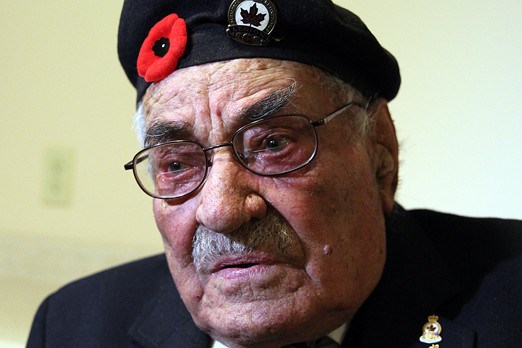As the Germans began to run roughshod over his native Poland, Edward Jakubowski was given a choice.
He could either join the Soviet army and fight for the communists, or be sent to a Russian labour camp. Jakubowski, now 91, chose the former, and fought his way through Europe and into Iraq as the Second World War dragged on into the mid 1940s.
“What was I supposed to do?” he asked. “They asked me to join the Russian army or go to work for a Russian factory. A person could be nuts to go to the Russian army or go work for them. I couldn’t stand them already,” he said.
“But you had no idea how they felt. They would slowly starve you to death. It was cold and whatever you had on you was your bedding, your clothing. It was 50 below zero. You could spit a foot and it turned to ice. You were up to your waist in snow.”
Though the Polish government-in-exile, stationed in London, demanded the release of the captives, the Soviets, under the dictatorship of Josef Stalin, chose to induct the remaining prisoners into the Russian army.
In February 1944 Jakubowski found himself in northern Italy, fighting in the Battle of Monte Cassino against the Germans and Italians.
Four times between January and May the Allies were assaulted by the enemy as they attempted to capture Monte Cassino. When all was said and done, 55,000 allies lay dead, with 20,000 German perishing in the fighting, a battle that to the Poles fighting stood as a symbol of hope for their country.
Jakubowski said it was tough to live through, not knowing if you were going to live or die.
“You’d make friends with someone, you’d tell them everything, then you’d turn around and they’d be dead,” he said.
When the war ended, and soldiers were being released to go home, Jakubowski and many of his colleagues realized they had nowhere to go.
“They left us for another year to occupy Italy. So after a year, on Nov. 1, 1946 we left Naples and arrived in Halifax on Nov. 11 and then found our way to Winnipeg.”
He met his future wife in Winnipeg, then after a two-year stint with Canada’s military, the family settled in Fort William, one of the twin cities that today is part of Thunder Bay.
Jakubowski attended an early Remembrance Day ceremony on Thursday at McKellar Place, which he now calls home, where he laid a wreath with the assistance of Mayor Keith Hobbs. He said today’s generation has a hard time understanding just what his went through.
Talking about it isn’t easy, he said.
“They tried to keep it quiet, to themselves. Our generation understands, but the younger generation, I doubt it. They know what their parents went through, but it’s hard to explain. If you didn’t see it, you wouldn’t believe it.”
He’s one of nine Second World War veterans living at the converted hospital, said Karen Larsen, the assistant general manager at McKellar Place.
She said they held the early ceremony to ensure all their residents would have a chance to honour the past.
“A lot of our veterans are unable to get out to the ceremonies at the cenotaphs or the Fort William Gardens, due to transportation issues or whether they can stand in the cold outside. This is our way of honouring them at an indoor service,” Larsen said.
Remembrance Day ceremonies will be held on Thursday at Waverly Park, Fort William Gardens and Mount McKay.
Sign in or register
- Messages
- Post a Listing
- Your Listings
- Your Profile
- Your Subscriptions
- Your Likes
- Your Business
- Support Local News
- Payment History
Registered Users
Already have an account?
New Users
Create a free account.
